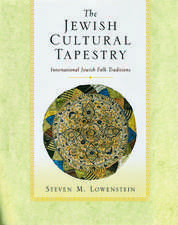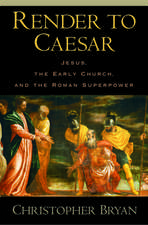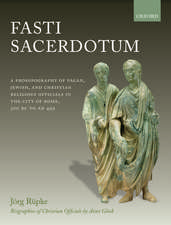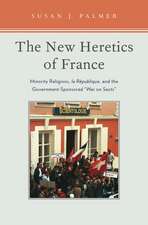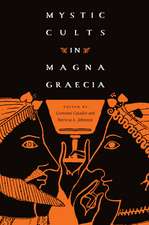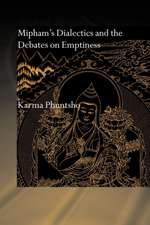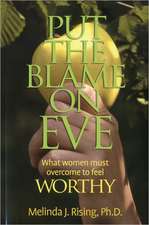The Language of Disenchantment: Protestant Literalism and Colonial Discourse in British India: AAR Reflection and Theory in the Study of Religion
Autor Robert A. Yelleen Limba Engleză Paperback – 8 noi 2012
| Toate formatele și edițiile | Preț | Express |
|---|---|---|
| Paperback (1) | 298.74 lei 31-38 zile | |
| Oxford University Press – 8 noi 2012 | 298.74 lei 31-38 zile | |
| Hardback (1) | 643.49 lei 31-38 zile | |
| Oxford University Press – 8 noi 2012 | 643.49 lei 31-38 zile |
Din seria AAR Reflection and Theory in the Study of Religion
-
 Preț: 254.97 lei
Preț: 254.97 lei - 18%
 Preț: 582.53 lei
Preț: 582.53 lei - 13%
 Preț: 188.31 lei
Preț: 188.31 lei - 14%
 Preț: 170.95 lei
Preț: 170.95 lei - 27%
 Preț: 489.17 lei
Preț: 489.17 lei -
 Preț: 227.70 lei
Preț: 227.70 lei - 30%
 Preț: 521.01 lei
Preț: 521.01 lei -
 Preț: 464.36 lei
Preț: 464.36 lei -
 Preț: 497.18 lei
Preț: 497.18 lei - 39%
 Preț: 216.87 lei
Preț: 216.87 lei - 35%
 Preț: 198.22 lei
Preț: 198.22 lei - 30%
 Preț: 534.65 lei
Preț: 534.65 lei - 30%
 Preț: 586.78 lei
Preț: 586.78 lei - 25%
 Preț: 643.57 lei
Preț: 643.57 lei - 30%
 Preț: 574.09 lei
Preț: 574.09 lei - 27%
 Preț: 359.59 lei
Preț: 359.59 lei - 14%
 Preț: 171.93 lei
Preț: 171.93 lei - 13%
 Preț: 123.96 lei
Preț: 123.96 lei - 9%
 Preț: 305.11 lei
Preț: 305.11 lei - 9%
 Preț: 121.57 lei
Preț: 121.57 lei - 14%
 Preț: 112.72 lei
Preț: 112.72 lei - 19%
 Preț: 342.54 lei
Preț: 342.54 lei -
 Preț: 289.76 lei
Preț: 289.76 lei - 30%
 Preț: 598.02 lei
Preț: 598.02 lei - 28%
 Preț: 443.61 lei
Preț: 443.61 lei - 10%
 Preț: 250.03 lei
Preț: 250.03 lei - 18%
 Preț: 346.70 lei
Preț: 346.70 lei - 28%
 Preț: 449.51 lei
Preț: 449.51 lei - 30%
 Preț: 579.68 lei
Preț: 579.68 lei - 30%
 Preț: 628.64 lei
Preț: 628.64 lei - 30%
 Preț: 582.93 lei
Preț: 582.93 lei -
 Preț: 353.47 lei
Preț: 353.47 lei - 15%
 Preț: 275.45 lei
Preț: 275.45 lei - 30%
 Preț: 579.27 lei
Preț: 579.27 lei - 25%
 Preț: 627.09 lei
Preț: 627.09 lei
Preț: 298.74 lei
Preț vechi: 325.78 lei
-8% Nou
Puncte Express: 448
Preț estimativ în valută:
57.16€ • 59.68$ • 47.31£
57.16€ • 59.68$ • 47.31£
Carte tipărită la comandă
Livrare economică 24-31 martie
Preluare comenzi: 021 569.72.76
Specificații
ISBN-13: 9780199925018
ISBN-10: 0199925011
Pagini: 320
Dimensiuni: 155 x 231 x 23 mm
Greutate: 0.39 kg
Editura: Oxford University Press
Colecția OUP USA
Seria AAR Reflection and Theory in the Study of Religion
Locul publicării:New York, United States
ISBN-10: 0199925011
Pagini: 320
Dimensiuni: 155 x 231 x 23 mm
Greutate: 0.39 kg
Editura: Oxford University Press
Colecția OUP USA
Seria AAR Reflection and Theory in the Study of Religion
Locul publicării:New York, United States
Recenzii
A rich contribution to scholarship on the growth and globalization of Christian language ideology. Yelle, an historian of religion, accomplishes two principal aims in his book. On a smaller (but still very large) scale, he effectively shows how various British colonial legal and religious projects in India were underpinned by Christian, specifically Protestant, language ideologies. More broadly, he presents a well-supported argument, following in the footsteps of Max Weber, that 'what we think of as modern, secular rationality is actually an inheritance from and a transformation of Christian soteriology'
Yelle's scholarship stretches across colonial encounters with Hindu myth, Indian languages and the practice of using mantras and is intended to take forward arguments made by Max Weber and developed by the likes of Talal Asad about the Protestant Christian roots of 'disenchantment', modernity and the religious-secular dichotomy. The result is a highly readable account Yelle offers the sort of balance and clarity with which postcolonial writing has not always been synonymous.
The observation that protestant anti-Catholicism informed British colonial critiques of India is by no means new. Yelle's achievement lies in how he demonstrates [this] through detailed use of a range of sources from protestant theology, the Hindu reform movements and colonial debates. It is certainly the case that the intellectual history of British India has not given the same attention to the protestant roots of secular governmental enterprises as its metropolitan counterpart. Yelle has produced a densely packed, highly nuanced argument. The richness and range of examples will add greatly to our understanding of the protestant dimensions of British India and give new vigour to the enduring debate about colonialism and modernity.
In this book, the British engagement with colonial India provides a robust case study for a more general inquiry into modernity, secularity, and 'the roots of modern exceptionalism and disenchantment.' Yelle is able to ambitiously engage with the history of colonialism in a way that is both unique and engaging--through his analyses, he is able to add a new and valuable theological dimension to the conversation about India's engagement with British colonial powers
This is a careful work of intellectual history based on extensive reading and profound knowledge. A vast canvas is mastered by the author, apparently with effortless ease. The coverage ranges from Christianity to Hinduism and from myth and idolatry to iconoclasm and science. Yelle's thesis is that the history of Protestantism must be studied much more deeply than has been done until now in order better to understand the meaning of British colonial discourse in India and the contingent reforms implemented there.
Theoretically rich and provocative...will command a place on reading lists of South Asian history seminars for generations to come. Yelle offers an excellent account of how Protestant literalism in the guise of attacks on Indian religions by Christians and Orientalists alike actually derives from older polemics aimed at, in earlier guises, Jews and Catholics, and then neatly reappearing in colonial India. This allows him to argue that the disenchantment Weber famously articulated actually has, like Orientalism and secularism, theological roots in the Christian world.
Yelle's scholarship is impeccable and nearly exhaustive-patently first-rate. The writing is precise, clear, and rich. Most importantly, the historical thesis about the theological roots of disenchantment and the Christian origins of modernity is, in my opinion, unanswerable. The book is profound and makes a very real and very important contribution to the fields of intellectual history, history of religions, Indian history, the history of Christianity, the history of the study of religion, and, perhaps most interesting of all, the philosophy of language.
Highly creative... Yelle directly challenges modern secularists who claim that modernity represents the triumph of rationality over religious superstition and of supposedly neutral, value-free judgment over prejudice... Yelle has written a fascinating, if also controversial, book, one that has important things to say to a wide number of disciplines.
Yelle's work on British critiques of South Asian mythological, ritual, linguistic, and legal traditions offer new insights on modernity, secularization, religious literalism, and colonialism.
Yelle's scholarship stretches across colonial encounters with Hindu myth, Indian languages and the practice of using mantras and is intended to take forward arguments made by Max Weber and developed by the likes of Talal Asad about the Protestant Christian roots of 'disenchantment', modernity and the religious-secular dichotomy. The result is a highly readable account Yelle offers the sort of balance and clarity with which postcolonial writing has not always been synonymous.
The observation that protestant anti-Catholicism informed British colonial critiques of India is by no means new. Yelle's achievement lies in how he demonstrates [this] through detailed use of a range of sources from protestant theology, the Hindu reform movements and colonial debates. It is certainly the case that the intellectual history of British India has not given the same attention to the protestant roots of secular governmental enterprises as its metropolitan counterpart. Yelle has produced a densely packed, highly nuanced argument. The richness and range of examples will add greatly to our understanding of the protestant dimensions of British India and give new vigour to the enduring debate about colonialism and modernity.
In this book, the British engagement with colonial India provides a robust case study for a more general inquiry into modernity, secularity, and 'the roots of modern exceptionalism and disenchantment.' Yelle is able to ambitiously engage with the history of colonialism in a way that is both unique and engaging--through his analyses, he is able to add a new and valuable theological dimension to the conversation about India's engagement with British colonial powers
This is a careful work of intellectual history based on extensive reading and profound knowledge. A vast canvas is mastered by the author, apparently with effortless ease. The coverage ranges from Christianity to Hinduism and from myth and idolatry to iconoclasm and science. Yelle's thesis is that the history of Protestantism must be studied much more deeply than has been done until now in order better to understand the meaning of British colonial discourse in India and the contingent reforms implemented there.
Theoretically rich and provocative...will command a place on reading lists of South Asian history seminars for generations to come. Yelle offers an excellent account of how Protestant literalism in the guise of attacks on Indian religions by Christians and Orientalists alike actually derives from older polemics aimed at, in earlier guises, Jews and Catholics, and then neatly reappearing in colonial India. This allows him to argue that the disenchantment Weber famously articulated actually has, like Orientalism and secularism, theological roots in the Christian world.
Yelle's scholarship is impeccable and nearly exhaustive-patently first-rate. The writing is precise, clear, and rich. Most importantly, the historical thesis about the theological roots of disenchantment and the Christian origins of modernity is, in my opinion, unanswerable. The book is profound and makes a very real and very important contribution to the fields of intellectual history, history of religions, Indian history, the history of Christianity, the history of the study of religion, and, perhaps most interesting of all, the philosophy of language.
Highly creative... Yelle directly challenges modern secularists who claim that modernity represents the triumph of rationality over religious superstition and of supposedly neutral, value-free judgment over prejudice... Yelle has written a fascinating, if also controversial, book, one that has important things to say to a wide number of disciplines.
Yelle's work on British critiques of South Asian mythological, ritual, linguistic, and legal traditions offer new insights on modernity, secularization, religious literalism, and colonialism.
Notă biografică
Robert A. Yelle is Assistant Professor in the Department of History and the Helen Hardin Honors Program at the University of Memphis. He received a Ph.D. in the History of Religions from the University of Chicago. A former Guggenheim Fellow, he is the author of Explaining the Mantras and The Semiotics of Religion, and co-author of After Secular Law.

